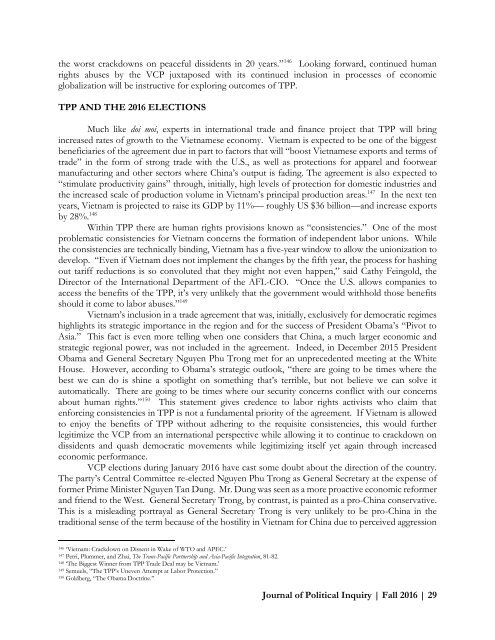Fall2016_Final2
You also want an ePaper? Increase the reach of your titles
YUMPU automatically turns print PDFs into web optimized ePapers that Google loves.
the worst crackdowns on peaceful dissidents in 20 years.” 146 Looking forward, continued human<br />
rights abuses by the VCP juxtaposed with its continued inclusion in processes of economic<br />
globalization will be instructive for exploring outcomes of TPP.<br />
TPP AND THE 2016 ELECTIONS<br />
Much like doi moi, experts in international trade and finance project that TPP will bring<br />
increased rates of growth to the Vietnamese economy. Vietnam is expected to be one of the biggest<br />
beneficiaries of the agreement due in part to factors that will “boost Vietnamese exports and terms of<br />
trade” in the form of strong trade with the U.S., as well as protections for apparel and footwear<br />
manufacturing and other sectors where China’s output is fading. The agreement is also expected to<br />
“stimulate productivity gains” through, initially, high levels of protection for domestic industries and<br />
the increased scale of production volume in Vietnam’s principal production areas. 147 In the next ten<br />
years, Vietnam is projected to raise its GDP by 11%— roughly US $36 billion—and increase exports<br />
by 28%. 148<br />
Within TPP there are human rights provisions known as “consistencies.” One of the most<br />
problematic consistencies for Vietnam concerns the formation of independent labor unions. While<br />
the consistencies are technically binding, Vietnam has a five-year window to allow the unionization to<br />
develop. “Even if Vietnam does not implement the changes by the fifth year, the process for hashing<br />
out tariff reductions is so convoluted that they might not even happen,” said Cathy Feingold, the<br />
Director of the International Department of the AFL-CIO. “Once the U.S. allows companies to<br />
access the benefits of the TPP, it’s very unlikely that the government would withhold those benefits<br />
should it come to labor abuses.” 149<br />
Vietnam’s inclusion in a trade agreement that was, initially, exclusively for democratic regimes<br />
highlights its strategic importance in the region and for the success of President Obama’s “Pivot to<br />
Asia.” This fact is even more telling when one considers that China, a much larger economic and<br />
strategic regional power, was not included in the agreement. Indeed, in December 2015 President<br />
Obama and General Secretary Nguyen Phu Trong met for an unprecedented meeting at the White<br />
House. However, according to Obama’s strategic outlook, “there are going to be times where the<br />
best we can do is shine a spotlight on something that’s terrible, but not believe we can solve it<br />
automatically. There are going to be times where our security concerns conflict with our concerns<br />
about human rights.” 150 This statement gives credence to labor rights activists who claim that<br />
enforcing consistencies in TPP is not a fundamental priority of the agreement. If Vietnam is allowed<br />
to enjoy the benefits of TPP without adhering to the requisite consistencies, this would further<br />
legitimize the VCP from an international perspective while allowing it to continue to crackdown on<br />
dissidents and quash democratic movements while legitimizing itself yet again through increased<br />
economic performance.<br />
VCP elections during January 2016 have cast some doubt about the direction of the country.<br />
The party’s Central Committee re-elected Nguyen Phu Trong as General Secretary at the expense of<br />
former Prime Minister Nguyen Tan Dung. Mr. Dung was seen as a more proactive economic reformer<br />
and friend to the West. General Secretary Trong, by contrast, is painted as a pro-China conservative.<br />
This is a misleading portrayal as General Secretary Trong is very unlikely to be pro-China in the<br />
traditional sense of the term because of the hostility in Vietnam for China due to perceived aggression<br />
146<br />
‘Vietnam: Crackdown on Dissent in Wake of WTO and APEC.’<br />
147<br />
Petri, Plummer, and Zhai, The Trans-Pacific Partnership and Asia-Pacific Integration, 81-82.<br />
148<br />
‘The Biggest Winner from TPP Trade Deal may be Vietnam.’<br />
149<br />
Semuels, “The TPP’s Uneven Attempt at Labor Protection.”<br />
150<br />
Goldberg, “The Obama Doctrine.”<br />
Journal of Political Inquiry | Fall 2016 | 29
















